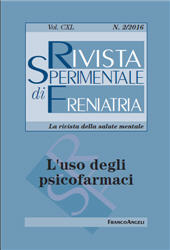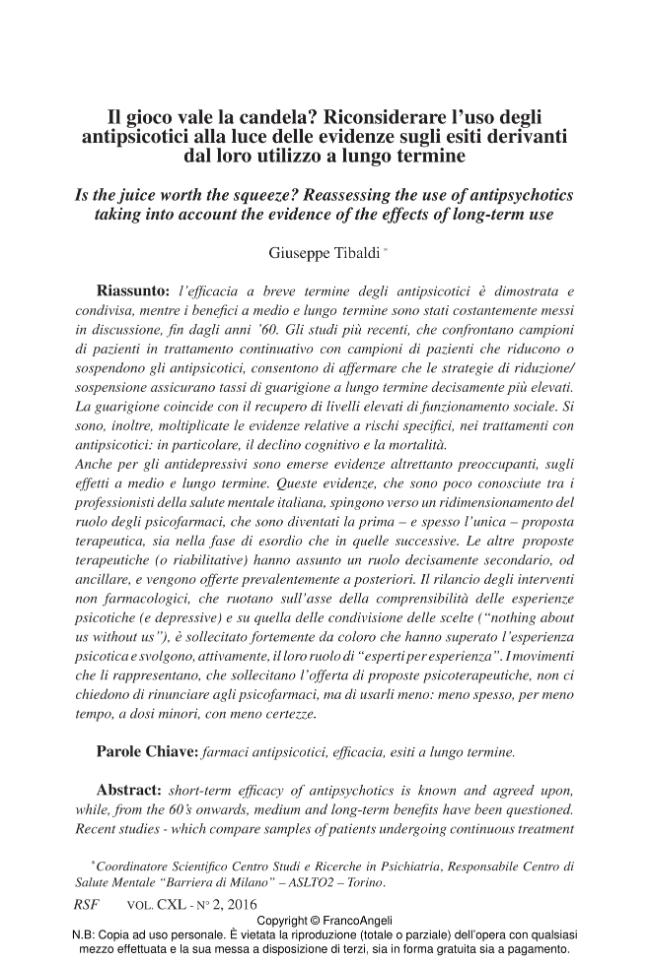Il gioco vale la candela? : riconsiderare l'uso degli antipsicotici alla luce delle evidenze sugli esiti derivanti dal loro utilizzo a lungo termine
43-63 p.
L'efficacia a breve termine degli antipsicotici è dimostrata e condivisa, mentre i benefici a medio e lungo termine sono stati costantemente messi in discussione, fin dagli anni '60. Gli studi più recenti, che confrontano campioni di pazienti in trattamento continuativo con campioni di pazienti che riducono o sospendono gli antipsicotici, consentono di affermare che le strategie di riduzione/ sospensione assicurano tassi di guarigione a lungo termine decisamente più elevati. La guarigione coincide con il recupero di livelli elevati di funzionamento sociale. Si sono, inoltre, moltiplicate le evidenze relative a rischi specifici, nei trattamenti con antipsicotici: in particolare, il declino cognitivo e la mortalità. Anche per gli antidepressivi sono emerse evidenze altrettanto preoccupanti, sugli effetti a medio e lungo termine. Queste evidenze, che sono poco conosciute tra i professionisti della salute mentale italiana, spingono verso un ridimensionamento del ruolo degli psicofarmaci, che sono diventati la pri
ma - e spesso l'unica - proposta terapeutica, sia nella fase di esordio che in quelle successive. Le altre proposte terapeutiche (o riabilitative) hanno assunto un ruolo decisamente secondario, od ancillare, e vengono offerte prevalentemente a posteriori. Il rilancio degli interventi non farmacologici, che ruotano sull'asse della comprensibilità delle esperienze psicotiche (e depressive) e su quella delle condivisione delle scelte ("nothing about us without us"), è sollecitato fortemente da coloro che hanno superato l'esperienza psicotica e svolgono, attivamente, il loro ruolo di "esperti per esperienza". I movimenti che li rappresentano, che sollecitano l'offerta di proposte psicoterapeutiche, non ci chiedono di rinunciare agli psicofarmaci, ma di usarli meno: meno spesso, per meno tempo, a dosi minori, con meno certezze.
Short-term efficacy of antipsychotics is known and agreed upon, while, from the 60's onwards, medium and long-term benefits have been questioned. Recent studies - which compare samples of patients undergoing continuous treatment with patients on reduced, or suspended, antipsychotic medications - highlight that strategies of reduced or suspended antipsychotic medications present significantly higher long-term recovery rates. Recovery consists in regaining high levels of social functioning. Furthermore, there is growing evidence on specific risks caused by antipsychotic treatments: i.e. cognitive decline and mortality. With antidepressants equally alarming evidence has emerged regarding medium and long-term effects. These evidences, little known among Italian mental health professionals, should bring about a reduction in the role played by psychiatric drugs, currently the primary - and often the only - therapeutic offer at onset, or during the subsequent phases of the illness. Nowadays, other therapeutic (or re
habilitative) proposals play a lesser, or subservient role, usually offered later on in the treatment program. Persons who have experienced a psychotic episode and play an active role as "experts by experience" request strongly the use of non-pharmacological interventions, based on the comprehension of the psychotic or depressive experiences, and on shared decision making ("nothing about us without us"). The movements of "experts by experience" require psychotherapeutic proposals, without asking to give up drugs, however they suggest reducing medications: i.e. less often, for less time, at lower doses, accompanied by fewer certainties.
Fait partie de
Rivista sperimentale di freniatria : la rivista dei servizi di salute mentale : CXL, 2, 2016-
Articles du même numéro (disponibles individuellement)
-
Informations
Code DOI : 10.3280/RSF2016-002004
ISSN: 1972-5582
KEYWORDS
- Farmaci antipsicotici, efficacia, esiti a lungo termine
- Antipsychotic drugs, effectiveness, long-term outcomes



